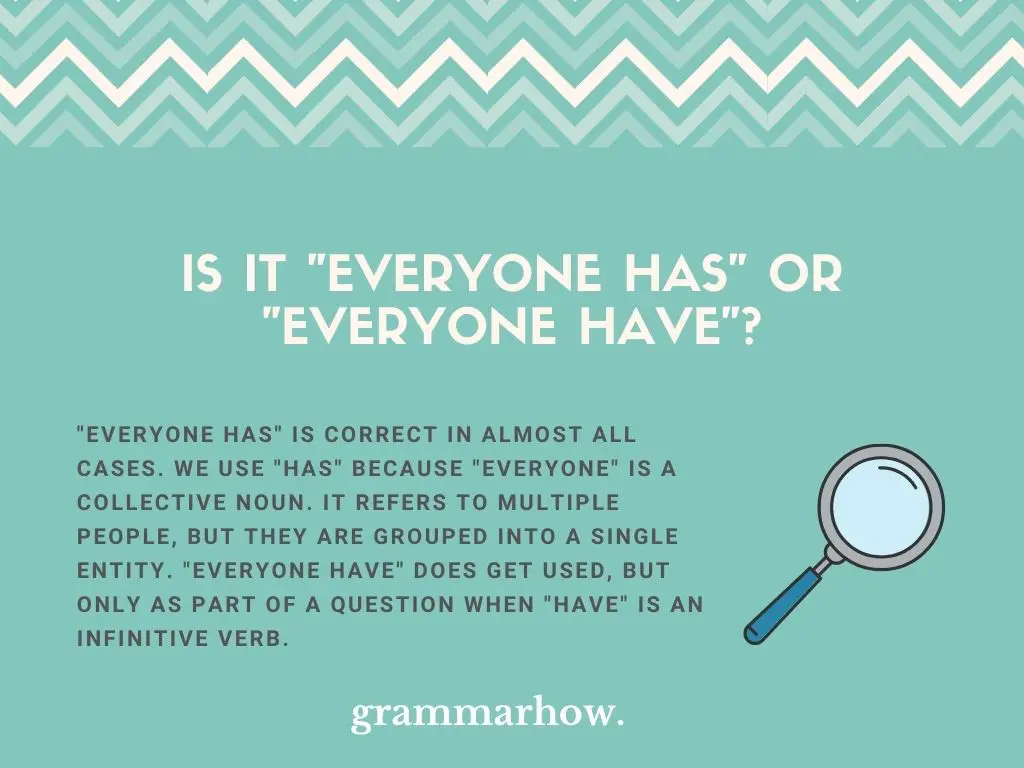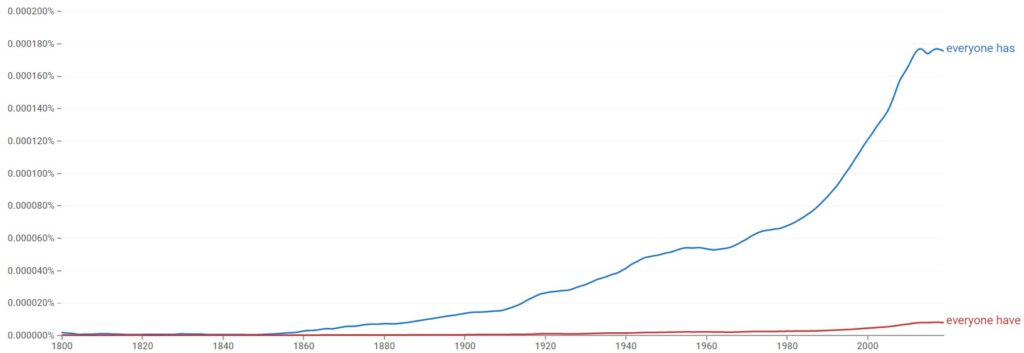Before using a verb with “everyone,” we have to make sure we understand the rules associated with it. It’s a collective noun, which dictates whether a singular or plural form has to be used. This article will explain all you need to know about it.
Is It “Everyone Has” Or “Everyone Have”?
“Everyone has” is correct in almost all cases. We use “has” because “everyone” is a collective noun. It refers to multiple people, but they are grouped into a single entity. “Everyone have” does get used, but only as part of a question when “have” is an infinitive verb.

For “everyone have” to be correct, we need a questioning verb like “does” or “could” to come before “everyone.” This allows us to use them as an auxiliary verb, which will turn “have” into the infinitive form (“to have”).
In this case, infinitive verb forms ignore the singular or plural rules of “everyone.” However, this situation is much less common than the typical and expected “everyone has.”
When Should I Use “Everyone Has”?
You should use “everyone has” when you’re talking about “everyone” as a group of people that “have” something. While it refers to many different people, we use it as a collective noun. This means that all those people are part of one single group.
There is no way for us to split up the individual members within the group. Therefore, it only makes sense to use “everyone has” whenever we write about it.
- Everyone has their own part to play. I’m just excited to see what they do.
- I’m sure everyone has something to say. You have to give them a chance to say it, though.
- Everyone has their own problems. You have to understand that; otherwise, nobody will ever trust you.
- Everyone has a partner already. Can we just start working on the game right now, please?
- I think everyone has had their say. It’s time to move on to the next stage of the debate.
- Everyone has had their opinions heard. Let’s move past this right now, please.
- I know everyone has problems. That’s why I’m trying to come up with a better solution for them.
When Should I Use “Everyone Have”?
“Everyone have” isn’t common, and it’s not correct as part of a sentence. Instead, it’s only correct when it’s used in a question. We need an auxiliary verb to come before “everyone” in this case, which allows us to change “have” into the infinitive form.
It’s rare to come across questions where “everyone have” is used. Nevertheless, it’s still grammatically correct, which is why it’s important to understand the rules around it.
- Can everyone have a think about what they want to do next, please?
- Does everyone have a partner? I think we need to make sure that nobody is left out.
- Will everyone have a look at what we’ve got here? It’s important that we’re all on the same page with this.
- Could everyone have a look? I want to make sure you know what’s happening before I finalize anything.
- Does everyone have a copy? Let’s go over what is expected of us before we have to meet again.
- Would everyone have said that if it weren’t for you encouraging them to do so?
- Can everyone have a moment of your time? I think they have a few things they’d like to ask.
Is “Everyone Has” Or “Everyone Have” Used The Most?
It might also help to look into some statistics to see which is more common. The results shouldn’t be too surprising.
“Everyone has” is used the most, according to Google Ngram Viewer. This is because it applies to most situations since it’s common to use the singular verb form “has” when writing about “everyone” as a collective noun.

“Everyone have” is much more specific. It only applies to situations when “everyone” is used in a question and “have” is in the infinitive form.
Is It “Everyone Who Has Been” Or “Everyone Who Have Been”?
“Everyone who has been” is correct because we use “has been” to show what has taken place in the situation. “Has” works here because “everyone” is treated as a singular group of multiple people (which is how the collective noun form works).
- Correct: Thank you to everyone who has been there for me in these trying times.
- Incorrect: To everyone who have been there for me, I want to say thank you. I couldn’t have done this without you.
Is It “Everyone Has Problems” Or “Everyone Have Problems”?
“Everyone has problems” is the only correct form when we are using it as part of a sentence or statement. We use “has” because it’s a singular, collective noun form. “Everyone have problems” only works as a question when another verb comes before “everyone.”
- Everyone has problems, Jon. You can’t keep thinking like you’re the only one that matters.
- Does everyone have problems with this situation? I thought we’d found a solution.
Is It “Hope Everyone Has” Or “Hope Everyone Have”?
“Hope everyone has” is the only correct form. We use “has” because “hope everyone has” can only be used as part of a sentence or statement. For this reason, we can only use the singular form to respect the collective noun of “everyone.”
- Correct: I hope everyone has had their say. I don’t think we have time to take any more questions.
- Incorrect: Well, I hope everyone have had a nice time. I’m excited to see you all again soon.
Is It “Everybody Has” Or “Everybody Have”?
“Everybody” works in the same way as “everyone.” We mainly use “has” when we are writing it in a sentence. It’s correct to do this because “everybody” is a collective noun. “Everybody have” only works when it’s part of a question.
- Everybody has the right to say what they’re thinking. It’s only fair that we listen.
- Does everybody have what they need? It’s time we moved on from here.
- Everybody has had their opinions heard. Let’s move on from this now.
- Will everybody have a look at the documents I put in front of you, please?
You may also like:
Everyone Is or Are – Is “Everyone” Singular or Plural?
“Everyone Was” or “Everyone Were” – Correct Version

Martin holds a Master’s degree in Finance and International Business. He has six years of experience in professional communication with clients, executives, and colleagues. Furthermore, he has teaching experience from Aarhus University. Martin has been featured as an expert in communication and teaching on Forbes and Shopify. Read more about Martin here.
